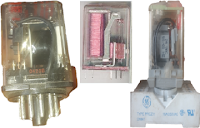Basically, Relay is open and close contact, to find out
inside the relay circuit, and use relay into different purpose in electrical
industry.
This open and close is also called (normally open) and
normally closed) and inside relay find out one coil. This coil purpose is to
make an electromagnet in the core when electrical power is applied in the coil,
and NC and NO is an interchange that means, NC contacts convert NO, and NO
contacts convert NC, this conversion is basically called make and break the
circuit or on/off the circuit.
Types of the relay.
Basic relay or Electromagnetic
Basic normally relays to find out in different on/off contacts that are:
(SPST,SPDT,DPST,AND
DPDT)
These phenomena you can also be read in my article in types of switches
Solid State Relay
consists of solid-state components like an integrated circuit(IC)
It is accustomed to perform change
operation with none movement in
its elements.
Its power gain is more than the magnetic attraction relays as
a result of it needs low
power as in input and provides high power at the output.
Hybrid Relay
Hybrid Relay is made up of electronic components and electromagnetic relays. Its input part consists of electronic circuitry which performs rectifications tasks. Its output part consists of an electromagnetic relay.
Thermal Relay
works on a very simple principle
based on heat effect i.e.
the rise in close temperature changes one position of the
contact to a different.
Mostly it
is used for motor protection purposes. It consists of temperature sensors
and control elements.
Reed Relays
Reed Relays
Reed Relays consist of a pair of
magnetic strips (also called as reed) that is sealed within a glass tube.
This reed acts as each AN armature and a contact blade.
The magnetic
flux applied to the coil is wrapped around this tube that produces these reeds move so change
operation is performed.
Related post
Transformer
Related post
Transformer

No comments:
Post a Comment